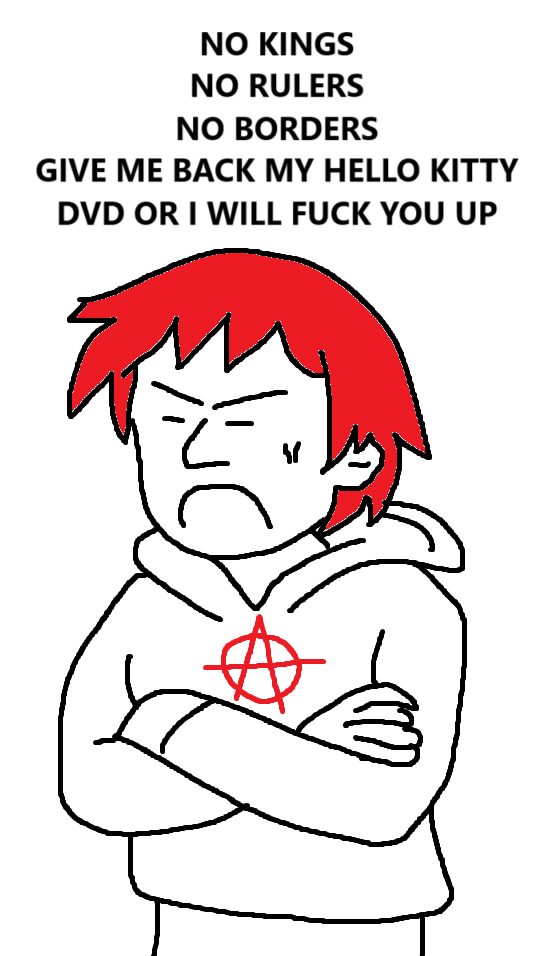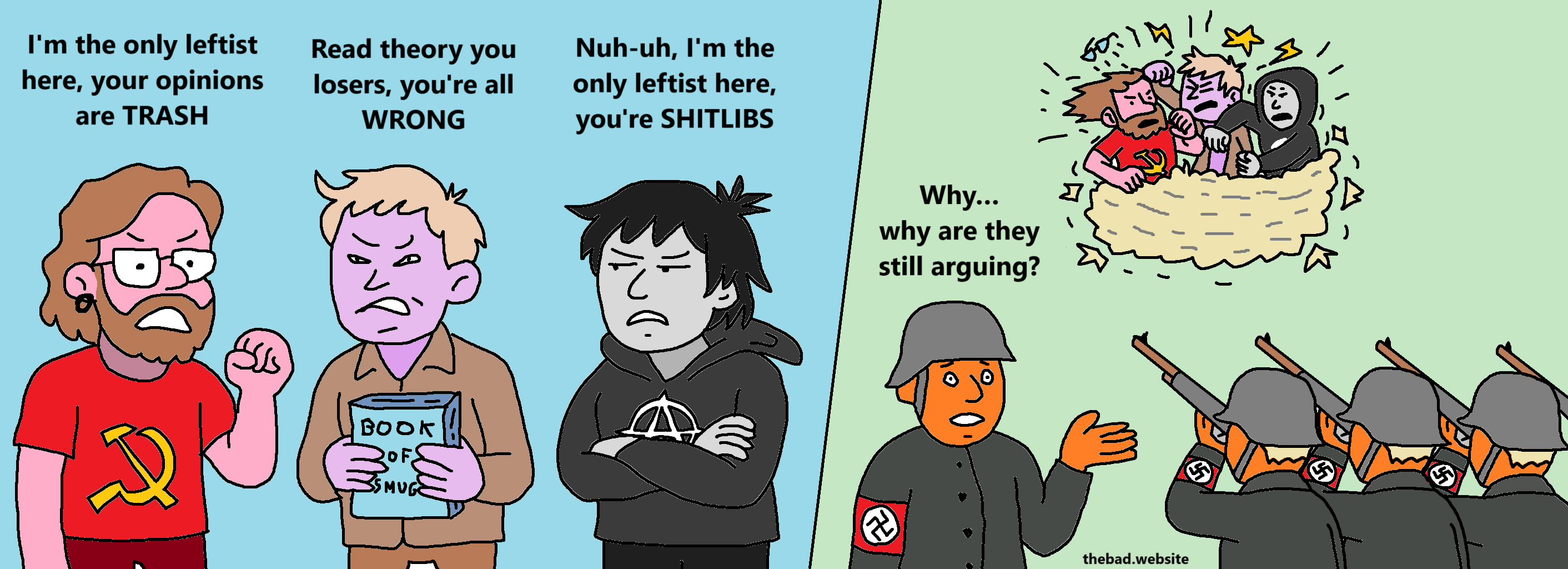this post was submitted on 30 Jul 2025
741 points (94.1% liked)
Comic Strips
20203 readers
2731 users here now
Comic Strips is a community for those who love comic stories.
The rules are simple:
- The post can be a single image, an image gallery, or a link to a specific comic hosted on another site (the author's website, for instance).
- The comic must be a complete story.
- If it is an external link, it must be to a specific story, not to the root of the site.
- You may post comics from others or your own.
- If you are posting a comic of your own, a maximum of one per week is allowed (I know, your comics are great, but this rule helps avoid spam).
- The comic can be in any language, but if it's not in English, OP must include an English translation in the post's 'body' field (note: you don't need to select a specific language when posting a comic).
- Politeness.
- AI-generated comics aren't allowed.
- Adult content is not allowed. This community aims to be fun for people of all ages.
Web of links
- !linuxmemes@lemmy.world: "I use Arch btw"
- !memes@lemmy.world: memes (you don't say!)
founded 2 years ago
MODERATORS
you are viewing a single comment's thread
view the rest of the comments
view the rest of the comments


Hierarchy isn't something antihetical to socialism, it exists in all systems. Further, I still don't really see how this model handles global systems of production and supply chains, and further still, I think you're just redefining socialism to only include anarchism, which is a semantical argument and not a logical one.
as a communist, i believe there is such a thing as a non-hierarchical system.
further, i dont really see how the PRC will ever achieve communism or socialism and further still, i think you are redefining socialism to include china, which is a semantical argument and not a logical one.
Communism is generally held to be about class and state abolition, not hierarchy in general. Delegates in your model still have hierarchy, what's important is accountability and that the general interest is upheld. As for the PRC, it's already socialist, the large firms and key industries are publicly owned. It certainly isn't anarchist, nor is it a stateless, classless, moneyless, global society, but it's socialist.
which are hierarchies, and the criticism of these are based on the same root issue that all hierarchies have. i admit that this statement was somewhat inflammatory, altho i firmly believe that anarchism is the natural conclusion of the communist idea.
no. the power is always among the people who choose the delegate, formulate their mandate, and can recall them at any time. the delegate has no power over the people, nor is the delegate coerced into their role.
and u can call the PRC socialist all u like, but that still dont make it true.
Inter-class hierarchy exists, ie bourgeois and proletarian, but intra-class hierarchy also exists, ie worker and manager. The Marxist critique of class involves the fact that there's hierarchy, but that's not the focus, the focus is on class as a social relation to production as informed by ownership. I'm more than willing to agree that your critique is the general anarchist critique, and I'm okay with you preferring anarchism, I just think that if you're trying to argue that Marxism isn't a communist ideology because it doesn't hold the same view of hierarchy as anarchism does, that that's a bit myopic.
Just because the delegate was elected and is subject to recall doesn't mean it isn't a hierarchy, though. Unless your point is that the delegate can only do what 100% of those who elected them want, and if any oppose them then they have no power, but in that case everything would collapse to a halt. The PRC has delegates and elections, and recall elections too, so I'm not sure I understand your criticism with that.
As for not considering the PRC socialist, are you saying it doesn't fit the anarchist conception of socialism, or the conception of socialism that includes Marxism as socialist? Ie, is your argument that the PRC does not meet the Marxist understanding of socialism as well as the anarchist? This is something that needs heavy judtification if so, but if you just mean the anarchist conception then I agree, the PRC isn't anarchist and isn't pretending to be.
ok this gotta be my last response bc i got better shit to do today.
so first off, i simply dont care what the marxist definition or critique of something is, so yes, please understand it as just the general anarchist critique.
well yes, if they want to stay a delegate they have to comply with the mandate they were given. i also understand that there may be practical considerations that lead ppl to choose weak (e.g. 95%) consensus decisions, and u can call that hierarchical if u like, but that doesnt mean we shouldnt strive to abolish all hierarchies.
the way u have described the PRC does not sound like they have delegates, rather representatives. ive already explained the difference.
as for considering the PRC state capitalist, this is my conception (altho i know a few marxists who agree), and so far ive only argued about the ownership situation and not touched upon wealth accumulation or markets at all, but i think ive still made a fair argument.
Well, up front, it's nice that you at least cleared up that you don't consider Marxism to be socialist. I disagree with that, of course, but now that we've established that your definition of socialism is exclusionary of Marxism, then that does at least mean we can have a consistent conversation.
As for delegates vs. representatives, the PRC's democracy extends beyond simply voting for candidates and representatives. I already explained that each rung makes decisions for that which their area needs, and elect from among themselves delegates that they can recall. People's integration into politics isn't relegated to simple elections, but consensus building, feedback, drafts of policy, etc.
As for ownership, your argument was that politicians are literally owners of publicly owned industry, which isn't how public ownership works anywhere. Even if the PRC is centrally planned for the majority of its large firms and key industries, that doesn't mean those large firms and key industries are run for profit, personal enrichment of capitalists, participate in markets, etc. There's nothing at all resembling capitalism there, so state capitalism is an absurdity. I gave clear examples of capitalist systems with heavy state involvement, like Singapore, that better fit "state capitalism."
Either way, this will be my last comment too. Have a good one!
https://www.youtube.com/watch?v=Zc2q-82G6dg
Again, I'm aware of the anarchist critique, I used to be an anarchist myself, I just firmly disagree with it.
yes, well, if u had watched it, u wouldve noticed its not about the anarchist critique.
I did watch it, just posting a 4 minute video from an anarchist YouTuber doesn't mean I immediately need to agree with it. Anark coats it as a Marxist critique, but it's thoroughly an anarchist critique attempting to claim higher and universal legitimacy by invoking Marx and Engels, but what Marx and Engels described as state capitalism was Bismarck's Germany, which had the large firms and key industries absolutely privately owned with minor exceptions like railways.
The state in Bismarck's Germany played a hand in directing the private economy, while retaining class relations. It wasn't because they had a state, it's because the base of production was capitalism, subject to the M-C...P...C'-M' circuit. Anark's critique is ignorant at best to dishonest at worst. Here's Engels directly speaking about it:
Instead, what needs to happen is proletarian revolution, and gradual appropriation of property into the hands of the new, proletarian state, until all property is collectivized and the proletarian state is no more:
So yes, I did watch it. It's one of those videos that only really makes sense to people that haven't put in the time to take Marxism seriously, and just want to quotegrab Marx and Engels to give their points higher legitimacy. Even Anark's examples of Chile and Yugoslavia were more market-focused and less collectivized, Yugoslavia in particular relied on IMF loans to keep going. Anark's mislabling of socialism as intrinsically worker-ownership and not collectivized ownership pretty much leaves only anarchism and anarchist adjacent ideologies as socialist. And, the USSR and PRC, Cuba, etc. do have worker democracy:
I'm sorry I took your video seriously, I guess? I dunno, were you just wanting me to concede the point outright?
im sorry to hear that after all of this u continue to claim the state is an extension of its people, and continue to mix representation and delegation. or for that matter, the myth of the state abolishing itself, which has no basis in reality.
ill give up on explaining this to u now. just one small thing: its spelled Bismarck, not Bismark.
Yes, after all of this I hold to the Marxist understanding, you haven't offered any compelling reason to abandon it, and have, to the contrary, shown a poor understanding of Marxism on both your's and Anark's parts. I'll correct a few of your misclaims about my stance here, though, for any popping in afterwards:
The state is an extension not of its people. The state is an extension of the ruling class, and the ruling class is determined by the base mode of production. A bourgeois state is one where private property is the base mode of production, and a proletarian state is one in which collectivized ownership is the base mode of production. As all property gets collectivized, class disappears, and so too does the need to oppress other classes, as everyone has equal ownership, leaving only instruments like social planning, administration, management, etc in place. That's the economic and historical basis of the elimination of the state.
As for delegates vs representatives, I understand the difference you claim they have, I just don't hold them as foundationally different to the point that one or the other invalidates the entire social basis of production.
Thanks for the Birmarck correction. Doesn't invalidate my points, but I'll make the correction regardless. If you have more questions, I'll be more than happy to answer.
I've never seen such unjustified condescension, my god.